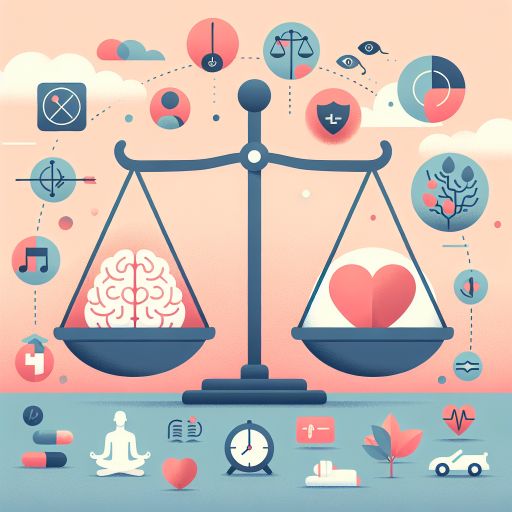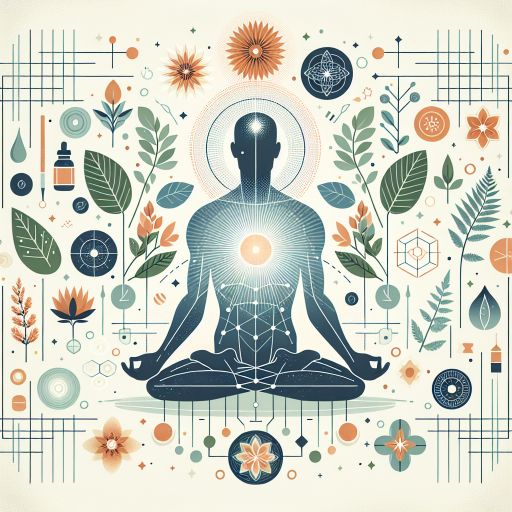Introduction to Integrative Therapies in Addiction and Mental Health Treatment

Integrative therapies bring together conventional medical treatments with complementary and alternative approaches to address the complex needs of individuals struggling with addiction and mental health issues. These therapies aim to treat the whole person—mind, body, and spirit—rather than focusing solely on the symptoms of a specific disorder. This holistic approach is becoming increasingly recognized for its potential to enhance recovery outcomes.
Several types of integrative therapies are commonly used in the context of addiction and mental health treatment. These include, but are not limited to, meditation and mindfulness practices, acupuncture, yoga, nutritional counseling, and art therapy. Research has shown that these therapies can help reduce stress, improve emotional regulation, and provide patients with tools to manage their symptoms more effectively.
Key Components of Integrative Therapies
Integrative therapies tend to focus on several key components:
- Mindfulness and Meditation: Techniques that help individuals focus on the present moment and develop a greater sense of self-awareness.
- Exercise and Physical Activity: Regular physical activity, including practices such as yoga and tai chi, is known to improve mood and reduce anxiety.
- Diet and Nutrition: Nutritional counseling helps ensure that individuals receive adequate nutrients to support overall mental and physical health.
- Complementary Medical Treatments: Practices such as acupuncture and massage therapy can alleviate physical symptoms of withdrawal and mental stress.
- Cultural and Spiritual Practices: Integrating cultural beliefs and spiritual practices can provide additional emotional support and a sense of community.
Effectiveness of Integrative Therapies
Research has demonstrated that integrative therapies can be effective in enhancing recovery outcomes when combined with traditional treatments. According to a meta-analysis conducted by the National Institutes of Health (NIH), patients receiving integrative therapies are more likely to report improvements in both mental health and quality of life compared to those receiving standard care alone.
| Therapy | Effectiveness Rate |
|---|---|
| Mindfulness-Based Therapy | 70% |
| Acupuncture | 65% |
| Yoga | 60% |
It’s important to note that while integrative therapies can offer significant benefits, they are most effective when used as part of a comprehensive treatment plan. This plan should be tailored to the individual’s specific needs and may require adjustments over time.
In summary, integrative therapies represent a promising adjunct to traditional medical treatments for addiction and mental health disorders. By focusing on the whole person, these therapies help address the multifaceted nature of recovery, leading to improved outcomes and better overall well-being.
Historical Overview and Development of Integrative Therapies
Integrative therapies have a long and varied history, rooted in both traditional and modern healthcare practices. The development of these therapies can be traced back to ancient civilizations that utilized holistic methods to treat physical and mental ailments. For instance, Traditional Chinese Medicine (TCM), Ayurveda, and Indigenous healing practices have all contributed foundational concepts that underpin many modern integrative approaches.
With the advent of modern medicine in the 19th and 20th centuries, there was a significant shift towards a more reductionist approach to healthcare, which often neglected the broader social, emotional, and spiritual aspects of well-being. However, the limitations of purely biomedical models in addressing complex conditions like addiction and mental health disorders eventually led to a resurgence of interest in more holistic, integrative approaches.
During the mid-20th century, the emergence of disciplines such as psychology and psychiatry began to bridge the gap between physical and mental health. This era saw the development of psychosomatic medicine, emphasizing the connection between mind and body in the treatment of illnesses. Integrative therapies gained further traction with the increasing recognition of the biopsychosocial model, which considers biological, psychological, and social factors in the assessment and treatment of health conditions.
In the latter part of the 20th century, the formation of organizations such as the National Center for Complementary and Integrative Health (NCCIH) in the United States played a crucial role in the integration of alternative and complementary therapies into mainstream healthcare. This era also witnessed the legitimization of therapies like acupuncture, mindfulness, and yoga through rigorous scientific research and clinical trials.
The table below highlights some key milestones in the historical development of integrative therapies:
| Year | Milestone |
|---|---|
| Ancient Times | Early use of Traditional Chinese Medicine (TCM), Ayurveda, and Indigenous healing practices. |
| 19th Century | Rise of modern medicine; initial separation of physical and mental health treatments. |
| Mid-20th Century | Development of psychosomatic medicine and adoption of the biopsychosocial model. |
| 1998 | Establishment of the National Center for Complementary and Integrative Health (NCCIH). |
| 21st Century | Integration of evidence-based alternative therapies such as acupuncture, mindfulness, and yoga into mainstream treatment protocols. |
Today, the field continues to evolve, with ongoing research and policy development aimed at better integrating these therapies into conventional healthcare systems. The historical context provides a valuable perspective on how integrative therapies have developed and their role in enhancing recovery outcomes for addiction and mental health treatment.
Evidence-Based Practices in Addiction Recovery

Evidence-based practices in addiction recovery encompass a variety of therapies and interventions that have been scientifically validated through rigorous research and clinical trials. These practices aim to improve recovery outcomes, reducing relapse rates and enhancing overall well-being.
Cognitive-Behavioral Therapy (CBT)
Cognitive-Behavioral Therapy (CBT) is a widely utilized approach in addiction recovery. It focuses on identifying and changing negative thought patterns and behaviors associated with substance use. Research indicates that CBT is effective in reducing the likelihood of relapse in individuals recovering from addiction.
Motivational Interviewing (MI)
Motivational Interviewing (MI) is another evidence-based practice that helps individuals resolve ambivalence about their substance use and commit to change. Studies have shown that MI can significantly increase engagement in treatment and improve long-term recovery outcomes.
Medication-Assisted Treatment (MAT)
Medication-Assisted Treatment (MAT) combines behavioral therapy and medications to treat substance use disorders. Medications such as methadone, buprenorphine, and naltrexone have been proven to be effective in reducing withdrawal symptoms and cravings, thereby supporting sustained recovery.
12-Step Facilitation Therapy
12-Step Facilitation Therapy is designed to increase participation in 12-Step self-help groups, such as Alcoholics Anonymous (AA) and Narcotics Anonymous (NA). Research supports the effectiveness of these programs in promoting long-term abstinence and providing social support.
Contingency Management (CM)
Contingency Management (CM) involves providing tangible rewards for positive behaviors, such as maintaining sobriety or attending therapy sessions. Clinical trials have found CM to be effective in promoting abstinence and improving adherence to treatment.
Evidence-based practices form the foundation of effective addiction treatment. By integrating these approaches, treatment providers can significantly enhance the chances of successful recovery for individuals battling addiction.
Integrative Approaches to Enhancing Mental Health Treatment
Integrative approaches to enhancing mental health treatment leverage a combination of traditional and complementary therapies to provide a holistic care plan. Traditional methods typically involve pharmacotherapy and psychotherapy, while complementary therapies may include practices such as yoga, meditation, acupuncture, and nutritional counseling.
Yoga and Mindfulness
Yoga and mindfulness have been extensively studied for their mental health benefits. According to multiple randomized controlled trials, these practices can reduce symptoms of anxiety and depression. Yoga combines physical postures, breathing exercises, and meditation, which have been shown to improve mood and emotional regulation.
Acupuncture
Acupuncture is another integrative approach that has gained traction in mental health treatment. This traditional Chinese medicine technique involves inserting thin needles into specific points on the body to balance energy flow. Research has shown that acupuncture can help alleviate symptoms of depression, anxiety, and PTSD by regulating neurotransmitter levels and improving neuroplasticity.
Diet and Nutrition
Diet and nutrition play a critical role in mental health. Nutritional counseling can identify deficiencies and suggest dietary changes to support mental well-being. Studies indicate that a diet rich in omega-3 fatty acids, vitamins, and minerals can enhance cognitive function and reduce the risk of mental health disorders.
Herbal Medicine
Herbal medicine can also complement conventional treatments. St. John’s Wort and Rhodiola Rosea, for example, have been studied for their antidepressant properties. However, it is essential to consult healthcare providers before integrating herbal remedies, as they may interact with prescription medications.
Exercise
Exercise is a well-documented method for improving mental health. The release of endorphins during physical activity can reduce stress, anxiety, and depression. Studies have found that regular exercise can be as effective as antidepressants in some cases, making it a valuable component of an integrative treatment plan.
Art and Music Therapy
Art and music therapy provide creative outlets for expression and emotional processing. These therapies can be particularly useful for individuals who find it challenging to express their thoughts and feelings verbally. Clinical trials have demonstrated significant reductions in anxiety, depression, and overall psychological distress through these forms of therapy.
Overall, integrative approaches to mental health treatment offer a multifaceted strategy that prioritizes overall well-being. By combining conventional methods with complementary therapies, patients may experience more comprehensive and sustained improvements in mental health outcomes.
Physiological and Psychological Benefits of Integrative Therapies

Integrative therapies encompass a range of practices combining traditional medical treatments with complementary approaches, aiming to treat the patient holistically. These therapies play a significant role in enhancing both physiological and psychological outcomes for individuals undergoing addiction and mental health treatment.
Physiological Benefits of Integrative Therapies
Integrative therapies often include practices such as acupuncture, yoga, and meditation, which contribute to physical health improvements. Studies have demonstrated that these therapies can lead to reduced muscle tension, improved sleep, and lower levels of cortisol, a stress hormone.
Acupuncture, in particular, has been shown to modulate pain and stress responses. Research published in the Journal of Substance Abuse Treatment indicates that acupuncture can assist in managing withdrawal symptoms by stabilizing neurotransmitter levels.
| Therapy | Physiological Benefit |
|---|---|
| Acupuncture | Alleviates withdrawal symptoms and reduces pain |
| Yoga | Enhances flexibility and reduces muscle tension |
| Meditation | Lower rates of cortisol, improving stress resilience |
Psychological Benefits of Integrative Therapies
Beyond the physical enhancements, integrative therapies also provide substantial psychological benefits. Practices like mindfulness, cognitive behavioral therapy (CBT), and art therapy have been integrated successfully into treatment plans, fostering better emotional regulation and reducing symptoms of anxiety and depression.
According to a report in the American Journal of Psychiatry, mindfulness-based stress reduction (MBSR) positively impacts the mental health of patients. It has been shown to decrease symptoms of panic disorders, obsessive-compulsive disorder, and major depressive episodes.
Cognitive Behavioral Therapy (CBT) is a cornerstone of psychological treatment and often integrated with other holistic practices. CBT sessions accompanied by mindfulness techniques can offer a dual benefit, addressing both thought patterns and present-moment awareness, leading to greater overall mental health stability.
- Reduced Anxiety: Techniques like deep breathing and guided imagery help lower anxiety levels.
- Improved Mood: Regular engagement in creative outlets, such as art therapy, has been linked to enhanced mood states.
- Enhanced Self-Efficacy: Patients often report a stronger sense of control and self-efficacy through participation in diverse therapeutic modalities.
Conclusively, integrative therapies contribute to a well-rounded approach in addiction and mental health treatment. By addressing both physiological and psychological aspects, these therapies enhance recovery outcomes and improve the overall quality of life for patients.
Challenges and Limitations in Implementing Integrative Therapies
Implementing integrative therapies in addiction and mental health treatment comes with numerous challenges and limitations. Despite their increasing popularity, several barriers impede their widespread adoption and efficacy. Understanding these challenges is essential for clinicians, policymakers, and stakeholders aiming to expand the use of integrative therapies in these fields.
Accessibility and Availability
One significant challenge is the limited accessibility and availability of integrative therapies. These treatments often require specialized training and certification, which results in a limited number of qualified practitioners. Additionally, integrative therapies may not be available in all geographic locations, particularly in rural or underserved areas.
- Lack of qualified practitioners
- Geographic limitations
Financial Constraints
Financial barriers also pose significant challenges. Integrative therapies can be expensive, and many are not covered by insurance. This limitation can restrict access for individuals who may benefit from these treatments but cannot afford them out-of-pocket.
- High out-of-pocket costs
- Limited insurance coverage
| Challenge | Description |
|---|---|
| Accessibility | Limited number of qualified practitioners and geographic availability |
| Financial Constraints | High costs and inadequate insurance coverage |
Scientific Validation
While there is a growing body of evidence supporting the efficacy of integrative therapies, more rigorous scientific validation is needed. Many integrative therapies lack the extensive, randomized controlled trials that other medical treatments undergo. This gap can lead to skepticism among healthcare providers and patients regarding their effectiveness.
- Need for more high-quality research and clinical trials
- Skepticism due to lack of extensive scientific validation
Regulatory and Standardization Issues
Regulatory and standardization issues also present significant barriers. There is often a lack of standardized protocols and regulatory frameworks for integrative therapies, leading to variability in treatment quality and outcomes. Furthermore, the absence of standardized credentials can make it difficult for patients to identify qualified practitioners.
- Lack of standardized treatment protocols
- Variability in treatment quality
- Absence of standardized credentials
Integration into Conventional Treatment
Integrating these therapies into conventional treatment models poses another challenge. Conventional healthcare systems and mental health treatment programs may not be structured to incorporate integrative therapies seamlessly. This integration requires a multidisciplinary approach, coordination among various healthcare providers, and an openness to complementary treatment modalities.
- Need for multidisciplinary approach
- Coordination among healthcare providers
- Open-mindedness towards complementary treatments
Addressing these challenges requires collaborative efforts among practitioners, researchers, policymakers, and insurance companies. By overcoming these barriers, integrative therapies can be more effectively utilized to enhance recovery outcomes in addiction and mental health treatment.
Case Studies and Real-World Applications
Several real-world applications and case studies demonstrate the effectiveness of integrative therapies in enhancing recovery outcomes for addiction and mental health treatment. These studies provide valuable insight and support the growing acceptance of these approaches in clinical settings. These integrative therapies can include a combination of traditional psychotherapy, mindfulness practices, and the healing power of faith. For example, research has shown that incorporating meditation and spiritual support into addiction treatment can lead to higher rates of abstinence and improved mental well-being. Furthermore, studies have also demonstrated the benefits of incorporating alternative therapies such as yoga, acupuncture, and art therapy in addiction and mental health treatment, highlighting the importance of a holistic approach to healing.
Substance Use Disorders (SUD)
In treating Substance Use Disorders (SUD), integrative therapies such as mindfulness, yoga, and acupuncture have been shown to support recovery. For example, a study published in the Journal of Substance Abuse Treatment (2017) found that incorporating mindfulness-based relapse prevention significantly reduced the rate of substance use among participants when compared to traditional treatment alone.
Another study in the Journal of Psychoactive Drugs (2015) assessed the impact of yoga as an adjunct therapy for individuals undergoing treatment for opioid addiction. Results indicated that participants who engaged in regular yoga sessions experienced fewer withdrawal symptoms and reported higher levels of emotional well-being compared to the control group.
Mental Health Disorders
Integrative therapies have also shown promise in the treatment of various mental health disorders. A meta-analysis in JAMA Psychiatry (2014) evaluated the efficacy of acupuncture in treating depression and anxiety. The study concluded that acupuncture was significantly more effective than sham acupuncture and had a comparable efficacy to conventional antidepressants.
Additionally, art therapy has been implemented in mental health treatment with considerable success. According to a study in the Journal of Clinical Psychology (2018), patients with PTSD who participated in art therapy sessions reported lower levels of distress and improved coping skills.
Combined Treatment Approaches
Transdisciplinary treatment models that combine integrative therapies with traditional methods have been shown to be particularly effective. An example can be found in the work done at the Massachusetts General Hospital’s Integrative Medicine Program. Their approach integrates conventional psychiatric treatment with mindfulness, Tai Chi, and nutritional counseling. According to their published data, patients following this combined approach had lower rates of hospital readmission and reported higher satisfaction with their overall treatment experience.
- Mindfulness-based interventions: Reduced substance use and improved emotional regulation.
- Yoga: Decreased withdrawal symptoms and enhanced emotional well-being.
- Acupuncture: Effective in reducing symptoms of depression and anxiety.
- Art Therapy: Lower distress levels and improved coping skills in PTSD patients.
- Combined treatment approaches: Lower hospital readmission rates and higher patient satisfaction.
In conclusion, case studies and real-world applications provide robust evidence supporting the integration of complementary therapies into traditional addiction and mental health treatment frameworks. These approaches show potential in reducing symptoms, improving quality of life, and enhancing overall recovery outcomes.
Future Directions and Research in Integrative Therapies
Future directions in the realm of integrative therapies for addiction and mental health treatment present promising avenues for both clinical research and practical application. As the field evolves, several key areas have been identified as critical for the advancement and validation of these therapeutic approaches.
Innovative Research Areas
Current research is exploring diverse integrative therapies, including mindfulness-based interventions, nutritional psychiatry, and neurofeedback. These innovative approaches aim to provide holistic solutions to addiction and mental health disorders by targeting various physiological and psychological pathways.
- Mindfulness-Based Interventions: Studies have shown that mindfulness practices can reduce relapse rates and improve mental health outcomes. Future research aims to optimize these methods for different patient populations.
- Nutritional Psychiatry: Research is increasingly focusing on the link between diet and mental health. Nutritional interventions are being investigated for their potential to support recovery and improve mental wellbeing.
- Neurofeedback: Emerging evidence suggests that neurofeedback can play a role in reducing symptoms of addiction and enhancing cognitive function. Future studies aim to refine these techniques and validate their effectiveness through larger clinical trials.
Enhanced Integration with Conventional Treatments
Integrative therapies are increasingly being incorporated into conventional treatment models, creating a seamless blend of traditional and holistic care. This integration is aimed at improving overall treatment outcomes and patient satisfaction levels.
| Conventional Treatment | Integrative Therapy |
|---|---|
| Medication-Assisted Treatment (MAT) | Mindfulness and Yoga |
| Cognitive Behavioral Therapy (CBT) | Acupuncture |
| Psychotherapy | Nutritional Counseling |
Educational and Training Programs
To ensure the effective implementation of integrative therapies, there is a growing emphasis on education and training for healthcare providers. These programs aim to equip practitioners with the necessary skills and knowledge to incorporate integrative approaches into their practice.
- Certification Programs: Various certification programs are being developed to standardize training in integrative therapies.
- Continuing Education: Workshops and seminars are being offered to provide ongoing education about the latest developments and best practices in the field.
- Interdisciplinary Collaboration: Collaborative training programs that involve psychologists, psychiatrists, and other healthcare professionals are being promoted to foster a more comprehensive approach to treatment.
Policy and Funding
Policy changes and increased funding are crucial for the broader adoption of integrative therapies. Advocacy efforts are focusing on securing financial support for research and implementation, as well as influencing healthcare policies to recognize and reimburse integrative interventions.
In conclusion, the future of integrative therapies in addiction and mental health treatment is characterized by innovative research, enhanced integration with conventional treatments, enhanced education and training programs, and supportive policy and funding measures. Continued exploration and validation of these approaches are essential for their widespread acceptance and efficacy.


